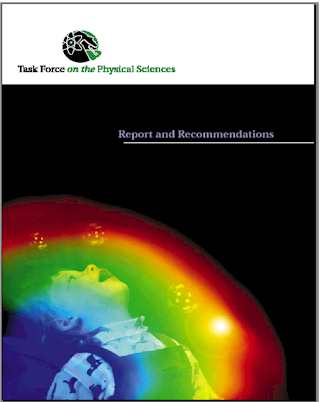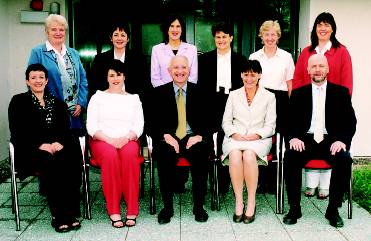| 2002 |

|
YEAR BOOK |
DEPARTMENT OF EDUCATION AND SCIENCE
|
Scientific Initiatives at
the Department of Education & Science
|

Task Force on the Physical Sciences
The Task Force on the Physical Sciences presented its report to the Minister earlier this year. The report contains a comprehensive set of recommendations designed to address the declining interest in the study of the physical sciences at second and third level.
The Task Force was set up towards the end of 2000 by the Minister for Education and Science, under the chairmanship of Dr Danny O�Hare, President Emeritus, Dublin City University. It had a total of 44 members who were representative of a wide range of educational and industrial interests. The Task Force was assisted in its work by two full-time National Strategy Co-ordinators � Dr �ine Allen and Mr Cyril Drury. The brief of the Task Force was:
-
to devise and recommend additional measures to address the
issue of low take-up rates;
-
to consider how physics and chemistry can be most effectively
promoted among students, particularly those at Junior
Certificate and Transition Year;
-
to review the impediments to the selection by students of the
physical sciences as second level subjects and as options at
third level.
The issues identified by the Task Force were ultimately grouped into six Action Areas and recommendations for addressing the issues are presented in each of these six areas. The recommendations, in summary, include:
-
School Planning and Resources � support for planning at local
level, and additional capital and current funding for science at
primary and post-primary level
-
Equity � provide additional teaching and physical resources to
ensure that every pupil has the opportunity to study the
physical sciences at primary and post-primary level
-
Teaching and Learning � promote high-quality teaching and
learning in science through the establishment of a virtual
learning environment, innovation and research in teaching,
in-career development for teachers, and review of pre-service
training of teachers
-
Curriculum and Assessment � advance curriculum development
in the sciences, establish science as a core subject at
junior cycle level, review mathematics curriculum, address
comparability of grading issues, establish an annual science
forum
-
Promotion of Science � establish an integrated national
science awareness programme
-
Science Education at Third Level � promote access and
recruitment to third level science, engineering and technology
SET) courses, promote quality teaching in, and develop
physical resources for, undergraduate SET courses.
The Task Force report was made available for consultation, with a deadline of 1 September for comments and observations on its findings and recommendations. Following this, an action strategy is being developed and put in place.
Copies of the report are available via the Task Force website at www.sciencetaskforce.ie and via the Department of Education and Science website at www.irlgov.ie/educ.
Physical Sciences Support Service
The in-career development programme for teachers of physics and chemistry was put in place in September 1999 as part of the Physical Sciences Initiative, described in previous issues of The Irish Scientist Year Book. The programme was designed as a threeyear programme with an estimated cost of some �3.8M in total. The programme has been delivered by a team of thirteen to sixteen full-time trainers based in Limerick Education Centre.
Just over 1000 chemistry teachers were invited to a total of seven days of training over the three years. The training has focused on course content, practical work and pedagogical issues. The practical work has been provided mainly to small groups of teachers in school laboratories and to larger groups in laboratory facilities in third level institutions, while the more contentoriented training has been provided to groups of teachers in local venues organised through the local education centre.
The programme has also provided some 900 physics teachers with an opportunity of attending six and a half days of inservice training. The approach to the provision of this training has been similar to that of the chemistry training except that training in practical work has concentrated on working in individual school laboratories.
The team of trainers has developed a wide range of support materials for teachers over the course of the three-year programme. Much of this has now been compiled onto a single CD which was distributed to all schools in May. This material can also be accessed on the Physical Sciences Initiative website at www.psinet. org. The team also intend to distribute two further CDs to schools in the autumn � one on the mandatory experiments in chemistry and one on the particle physics option from the physics syllabus.
The in-career development programme was originally intended to run for three years, finishing in May of this year. However, it has now been decided to extend the programme for another year. This is partly due to a need to compensate for time lost over the course of the programme arising from the Foot and Mouth Disease crisis, and also difficulties arising from the industrial relations situation in some schools. The extension of the programme also constitutes a preliminary response to some of the issues raised in the report of the Task Force on the Physical Sciences.
National Biology Support Service
The National Biology Support Service was established in January 2001 and is based in Tralee Education Centre. The Service, which consists of a National Co-ordinator and eleven Regional Development Officers and an Administrator, provides a comprehensive programme of in-service training for biology teachers.
The programme of in-service training provides teachers with the knowledge and skills required to teach the new biology syllabus, presents them with the most modern methodologies of teaching and renews in them a competence and accountability as teaching professionals. In summary, its aim is to renew in teachers a love and enthusiasm for both biology and their professional role as teachers.
The work of the Support Service Team started in September 2001. School principals nominated a total of 1725 biology teachers to participate in the programme of in-service.
Following intensive training of the Regional Development Officers, the first national in-service training offered to biology teachers in Ireland began on 19 November 2001 and was conducted over nine days to 6 December 2001 in 93 one-day meetings for groups of teachers at local venues. A total of 1044 teachers � i.e. over 60% of the original applicants � attended these meetings. The second round of nine days of meetings was planned for February 2002 but these were postponed after three days at the request of the school managerial bodies due to disruption to schools. The support service is developing a range of support materials for teachers. It is also intended to establish an interactive website by the autumn.
Curriculum and Assessment
A new Biology syllabus has been developed by a course committee of the National Council for Curriculum and Assessment. The former Biology syllabus dates from 1973, and there have been major changes in our understanding of biology and in its applications in the intervening years. The Nobel prize winner for Chemistry (1996) Robert F. Curl has stated, �The 20th century was the century of physics and chemistry but it is clear that the next century will be the century of biology�.
The revised biology syllabus, as well as being modernised in content, spells out a number of mandatory practical activities as well as referring to contemporary issues and applications. Its new approach is reflected in the division of the syllabus into three main components: Biology � The Study of Life; The Cell; and The Organism. The revised syllabus places increased emphasis on skill attainment, and practical laboratory and field activities are integral to the teaching of the subject. The integration of information and communication technology into the teaching of the subject is promoted.
New syllabi in both physics and chemistry were introduced to schools in September 2000 and were examined for the first time in June of this year. It is hoped that these new syllabi, with their increased emphasis on student practical work and on the interface between science, technology and society, will provide a significant boost to the physical sciences at second level. Work is also ongoing on the revision of the remaining two Leaving Certificate science subjects, Physics & Chemistry and Agricultural Science.
At Junior Certificate level, a revised draft syllabus was circulated for consultation in May of this year. This revised syllabus has a greatly increased emphasis on investigative work by students and on the applications of science in everyday life.
Chief Examiners� Reports
Each year the Chief Examiners� reports are published for a number of subjects. This year saw the publication of reports on the 2001 examinations in four of the sciences: Leaving Certificate Biology, Agricultural Science, and Physics & Chemistry, and Junior Certificate Science. These reports give an overview of the grades obtained, an analysis of the answering of the paper, and recommendations for teachers and students. Copies of these reports are available on the Department�s website, www.irlgov.ie/educ/Exams/reports.htm.

Front Row: Deirdre Knox (RDO), Marie Treacy (RDO), John Lucey (NCO), �na Moroney (RDO), Ged McGuire (RDO) [Absent: Alan Dunne (RDO)] RDO � Regional Development Officer; NCO � National Co-ordinator.
Contact: Dr Carl � D�laigh, Deputy Chief Inspector,
Department of Education and Science,
Marlborough Street, Dublin 1.